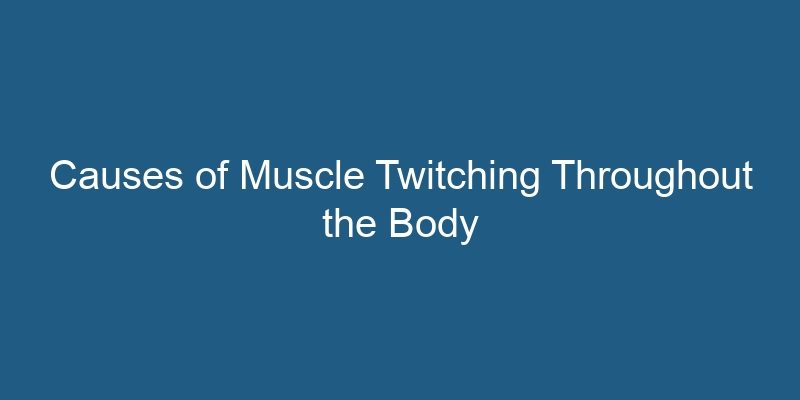Muscle twitches, also known as fasciculations, are involuntary contractions of muscles that can occur throughout the body. These twitches are usually harmless and temporary, but they can sometimes be a sign of an underlying medical condition. In this article, we will explore some of the common causes of muscle twitching and discuss each subtopic in detail.
- 1. Stress and Anxiety
- 2. Fatigue and Sleep Deprivation
- Why does whole body muscular twitching & weakness happen? – Dr. Sanjay Panicker
- Muscle Twitching, fasciculation, when should i worry about muscle twitching
- 3. Electrolyte Imbalance
- 4. Nutritional Deficiencies
- 5. Medications and Caffeine
- 6. Nerve Damage and Disorders
- 7. Exercise and Physical Activity
- 8. Caffeine and Alcohol Withdrawal
- Conclusion
1. Stress and Anxiety
Stress and anxiety can have a significant impact on our physical health, including muscle twitches. When we are under stress or experiencing anxiety, our body releases stress hormones that can lead to muscle tension and twitching. The muscles most commonly affected by stress-related twitching are the ones in the face, neck, and shoulders.
It is important to manage stress and anxiety through relaxation techniques, such as deep breathing exercises, meditation, or engaging in activities that promote relaxation. Seeking professional help, such as therapy or counseling, can also be beneficial in managing stress and anxiety.
2. Fatigue and Sleep Deprivation
Another common cause of muscle twitching is fatigue and sleep deprivation. When we are tired, our muscles can become overworked and more prone to twitching. Lack of sleep disrupts the normal functioning of our muscles, leading to involuntary contractions.
To prevent muscle twitching caused by fatigue and sleep deprivation, it is essential to prioritize sleep and ensure an adequate amount of rest each night. Establishing a regular sleep schedule, creating a comfortable sleep environment, and practicing good sleep hygiene can help improve the quality of sleep and reduce muscle twitches.
Why does whole body muscular twitching & weakness happen? – Dr. Sanjay Panicker
Muscle Twitching, fasciculation, when should i worry about muscle twitching
3. Electrolyte Imbalance
Electrolytes are minerals in our body that help maintain proper muscle function. When there is an imbalance in electrolyte levels, such as low levels of potassium, calcium, or magnesium, muscle twitches can occur. These imbalances can be caused by various factors, including dehydration, excessive sweating, or certain medical conditions.
To restore electrolyte balance and reduce muscle twitching, it is important to stay hydrated by drinking enough fluids and consuming foods rich in electrolytes. Including foods like bananas, oranges, spinach, and nuts in your diet can help replenish electrolyte levels naturally.
4. Nutritional Deficiencies
Inadequate intake of essential nutrients can also contribute to muscle twitching. Deficiencies in vitamins B12, D, or E, as well as minerals like iron or potassium, can affect the proper functioning of muscles and increase the likelihood of twitching.
Ensuring a well-balanced diet that includes a variety of fruits, vegetables, whole grains, and lean proteins can help prevent nutritional deficiencies and reduce the occurrence of muscle twitches. In some cases, supplements may be recommended to address specific deficiencies.
5. Medications and Caffeine
Certain medications, such as corticosteroids or diuretics, can cause muscle twitching as a side effect. Additionally, excessive consumption of caffeine, found in coffee, tea, energy drinks, and some medications, can also contribute to muscle twitching.
If you suspect that medication or caffeine intake is causing your muscle twitches, it is important to consult with a healthcare professional. They may recommend adjusting the dosage or exploring alternative medications to alleviate the symptoms.
6. Nerve Damage and Disorders
In some cases, muscle twitching can be a result of nerve damage or disorders. Conditions such as peripheral neuropathy, multiple sclerosis, or ALS (amyotrophic lateral sclerosis) can affect the nerves that control muscle movement, leading to involuntary twitches.
If you are experiencing muscle twitches along with other symptoms like weakness, numbness, or difficulty coordinating movements, it is crucial to seek medical attention to determine the underlying cause and receive appropriate treatment.
7. Exercise and Physical Activity
Engaging in intense exercise or physical activity can sometimes trigger muscle twitches. This is often due to muscle fatigue, dehydration, or electrolyte imbalances caused by excessive sweating and exertion.
To prevent exercise-induced muscle twitches, it is important to warm up properly before engaging in strenuous activities, stay hydrated throughout the workout, and replenish electrolytes with sports drinks or natural sources. Listening to your body and allowing for adequate rest and recovery is also essential.
8. Caffeine and Alcohol Withdrawal
Lastly, sudden withdrawal from caffeine or alcohol consumption can lead to muscle twitching as well. These substances can alter the neurotransmitters in our brain and affect muscle function. When the body is deprived of caffeine or alcohol, it can trigger withdrawal symptoms, including muscle twitches.
Gradually reducing caffeine or alcohol intake instead of quitting abruptly can help minimize withdrawal symptoms and reduce the occurrence of muscle twitches. Seeking support from healthcare professionals or support groups can also be beneficial during the withdrawal process.
Conclusion
Muscle twitches can be caused by various factors, including stress, fatigue, electrolyte imbalances, nutritional deficiencies, medications, nerve damage, exercise, and withdrawal from caffeine or alcohol. While most muscle twitches are harmless and temporary, if they persist or are accompanied by other concerning symptoms, it is important to seek medical advice for proper evaluation and treatment.

